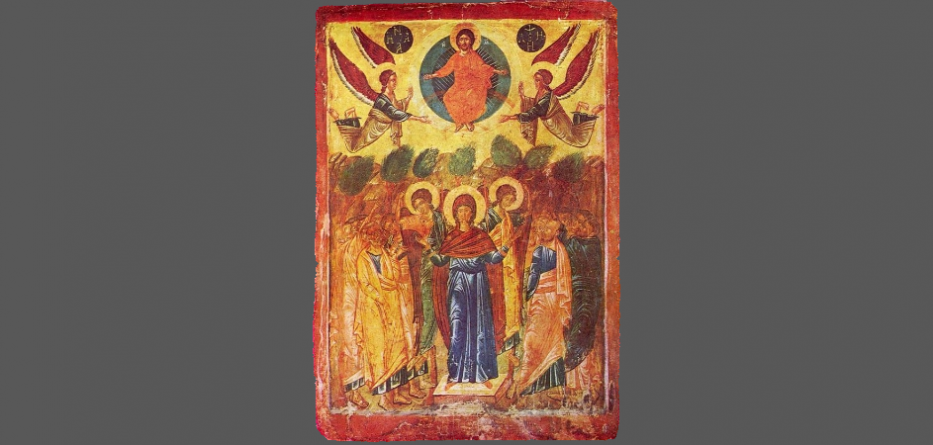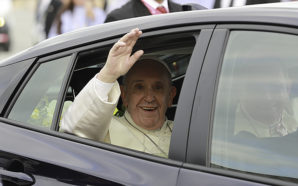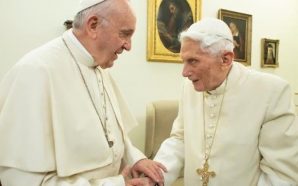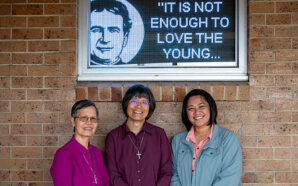Homily for The Ascension of the Lord Year A 2020
Readings: Acts 1:1-11; Mt 28:16-20
24 May 2020
Today we celebrate the Ascension of Jesus. There came a time after the crucifixion of Jesus and his resurrection when the Risen Lord was no longer apparent to the disciples as they went about their task proclaiming the Good News. The writer of Luke’s gospel commences his second book The Acts of the Apostles with the apostles, after 40 days, looking on as Jesus disappears from their midst, and forever. They’re asked, ‘Why are you men from Galilee standing here looking into the sky?’ At the end of Matthew’s gospel, the 11 disciples had set out for Galilee where Jesus commanded them, ‘Go, make disciples of all the nations; teach them to observe all the commands I gave you. And know that I am with you always; yes, to the end of time.’
We are still in that time. The risen Jesus has disappeared from our midst. We have a commission to bring good news to everyone, teaching them to observe the teachings of the Sermon on the Mount which take up and fulfil the teachings of the Torah with a universalism of love and justice which is impractical and unattainable without God’s grace. We are commissioned to tell anyone willing to listen that the Lord is with us, through thick and thin, through life and death. We are commissioned to proclaim a way of living that can bring fulfilment to all.
LISTEN: https://soundcloud.com/frank-brennan-6/homily-24520
In the age of the coronavirus and in the face of global challenges like pollution, climate change, water shortages, loss of biodiversity, global inequality, and the decline of the quality of human life and the breakdown of society, we face many challenges. The catalogue of nasties I’ve just listed are the matters canvassed by Pope Francis in his encyclical Laudato Si which he issued five years ago today. The encyclical subtitled On Care for Our Common Home is addressed to ‘every person living on this planet’.(LS3) ‘Laudato Si, mi Signore – Praise be to you, my Lord’, are the opening words of the encyclical and they come from the canticle of Francis of Assisi described by the pope as ‘the example par excellence of care for the vulnerable and of an integral ecology lived out joyfully and authentically’.(LS10) Pope Francis urges us to approach nature and the environment with ‘openness to awe and wonder’, speaking ‘the language of fraternity and beauty in our relationship with the world’. (LS11)
The late Fr Denis Edwards from Adelaide was a systematic theologian who did much to open up for us the relationship between God and creation, allowing us to see Christ events like the Ascension which we celebrate today, in a broader perspective. His last two books were entitled Partaking of God: Trinity, Evolution and Ecology, and Jesus and the Natural World: Exploring a Christian Approach to Ecology. Denis never tired of warning us that nature was not just warm and fuzzy. He insisted that our theology of the natural world had to be ‘robust enough to deal with randomness and contingency’. It also had to come to terms with the costs of evolution over the last 3.8-billion-year history of life: ‘the loss, the pain, the predation, the deaths, and the extinctions of most species that ever lived’. This cannot be done by putting human beings at the centre or on the top of the pyramid of creation. We need to see that other creatures have value in themselves. They, like us, reveal something of God. They, with us, ‘form a sublime communion of creation in God’(LS89). Pope Francis tells us that ‘all creatures are connected, each must be cherished with love and respect, for all of us as living creatures are dependent on one another’.(LS42) He urges us to ‘forcefully reject the notion that our being created in God’s image and given dominion over the earth justifies absolute dominion over other creatures.’ (LS67) ‘Each of the various creatures, willed in its own being, reflects in its own way a ray of God’s infinite wisdom and goodness’. God enfolds every creature with his affection. (LS77) [See ‘Everything is connected at https://www.mercyworld.org/about/our-initiatives/mgp-themes/segment-2/reflective-prayer-degradation-of-earth/]
Marking the fifth anniversary of this encyclical on the feast of the Ascension, we can see new meaning in the Ascended Christ, appreciating that ‘The ultimate purpose of other creatures is not to be found in us. Rather, all creatures are moving forward with us and through us towards a common point of arrival, which is God, in that transcendent fulness where the risen Christ embraces and illumines all things.’(LS83)
It’s a novel experience for me, and perhaps also for you, to contemplate that we are ‘joined in a splendid universal communion’ with all creation. (LS220) As we contemplate the sight of the ascending Jesus with the onlooking apostles, we can expand our vision and theirs appreciating that ‘Christ has taken unto himself this material world and now, risen, is intimately present to each being, surrounding it with his affection and penetrating it with his light.’ (LS 221)
I make no claim to be a mystic. I have a very practical bent and a strong interest in national affairs. We Australians have just come through an horrific summer of bushfires which singed our national consciousness forever with the realisation that climate change is real and that it has drastic consequences for us and our continent. No one now seriously doubts that human activity contributes to climate change. The disagreement is over the extent to which human activity exacerbates the situation and the extent to which any human planning can mitigate the adverse effects. Most people now accept that human activity makes the situation worse. No one seriously argues that the emission of greenhouse gases makes the situation better. But what is to be done? We need to attend to politics and economics.
Pope Francis does not pretend to have all the answers. No one should use the pulpit to evangelise just one set of answers when there are many options. In Laudato Si, Francis says (LS60):
[W]e need to acknowledge that different approaches and lines of thought have emerged regarding this situation and its possible solutions. At one extreme, we find those who doggedly uphold the myth of progress and tell us that ecological problems will solve themselves simply with the application of new technology and without any need for ethical considerations or deep change. At the other extreme are those who view men and women and all their interventions as no more than a threat, jeopardizing the global ecosystem, and consequently the presence of human beings on the planet should be reduced and all forms of intervention prohibited. Viable future scenarios will have to be generated between these extremes, since there is no one path to a solution. This makes a variety of proposals possible, all capable of entering into dialogue with a view to developing comprehensive solutions.
Last week, the ABC 4 Corners program revisited the Climate Wars in Australian politics since 2005. Over the last 15 years, Liberal Prime Ministers Howard and Turnbull and Labor Prime Ministers Rudd and Gillard have seen a need to institute some form of emissions trading scheme, as Australia’s contribution to setting the community of nations on the right path. This is not the place to step into the party politics. The powerful insights of the programme came from three gentlemen who have headed the key departments of Prime Minster and Cabinet and Treasury under governments of both persuasions – three of the most talented public servants in the nation.
Martin Parkinson ended his career as head of the Prime minister’s department. Back in 2006 he received a phone call from Ken Henry, head of Treasury, saying, ‘Peter Shergold (head of the Prime Minister’s Department) and a group of us have convinced John Howard that we need to look at this. Are you prepared to lead the secretariat? And my reaction was, “What do I know about climate change?” And the response was, “That’s exactly why we want you to lead the secretariat. We want somebody who’s going to come at this with a clean slate.”’
On television on Monday night, Parkinson explained, ‘The carbon price isn’t about taxing people. The carbon price is actually about creating the right sort of incentives to develop the technology and then use it.’ Despite the clear advice, John Howard was unable to deliver it. Once Howard left politics, the issue became very divisive in the Liberal Party. Some opponents said they were trying to save the Liberal Party because this was an issue that was going to tear the party and the coalition apart. Ken Henry who had been head of Treasury told us on Monday night: ‘Well, I was frankly more interested in the national interest than the future of the Liberal Party in Australia. The question you should be asking yourself is what is the least economically damaging way of achieving that cap on national emissions? And the answer to that question, and everybody will tell you this, is an emissions trading scheme.’
Peter Shergold who had been the head of the Prime Minister’s Office under John Howard was asked what he would say to the prime minister today if he were advising him. He answered thus: ‘You much more than me prime minister can create the narrative. That’s what a leader does. To create the narrative of why we need to do this. But my sense prime minister is that there is a mood to follow such leadership if it exists. And tell it honestly and tell it truthfully and don’t try and pretend there are not going to be costs imposed on industry and costs imposed on individuals. But it is worth that for the sake of your children and your grandchildren.’ When considering diverse political and economic options, let’s expand our vision to include those future generations as well as the poor in our midst.
Fr Denis Edwards assured us that Laudato Si provides us with ‘the basis for a systematic theology of the natural world, in which other creatures have value in themselves, in which they can be seen as revealing God, and in which they, with us, form a sublime communion of creation in God.’ The apostles on Ascension Day did not just continue staring into the sky when Jesus disappeared. They set about their mission and were filled with the Holy Spirit at Pentecost. Once the virus abates, let’s get out there, spreading the good news to all people of good will. Let’s embrace the whole of creation which is ‘moving forward with us and through us towards a common point of arrival, which is God, in that transcendent fulness where the risen Christ embraces and illumines all things’.(LS83)
1
Fr Frank Brennan SJ is the Rector of Newman College, Melbourne and the former CEO of Catholic Social Services Australia (CSSA).








